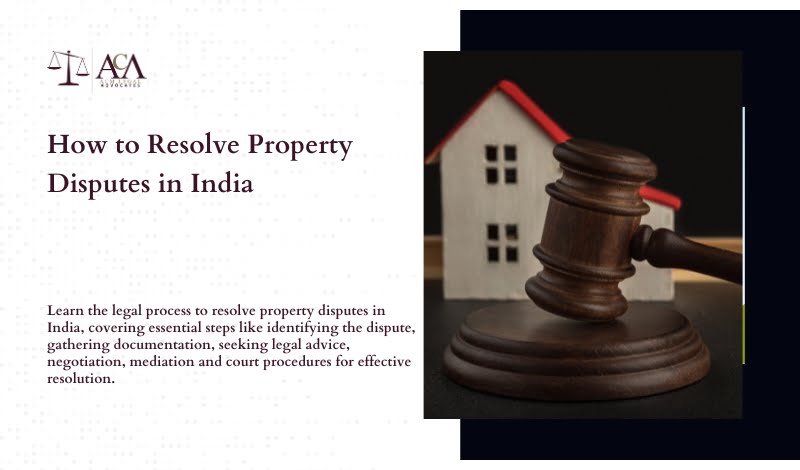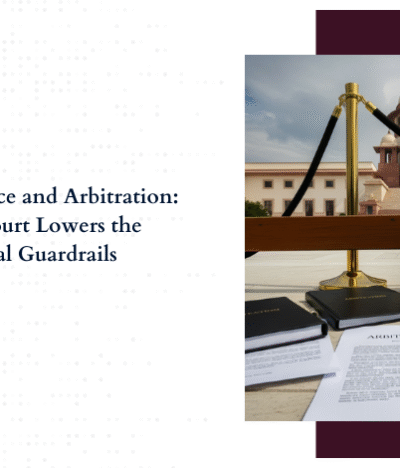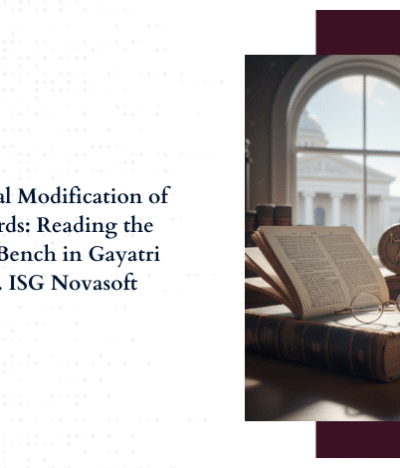How to resolve a property dispute in India? It is commonly believed that property disputes are difficult to resolve and often take years or even decades. This is influenced by several factors, such as the intricacy of the property regulations, the case’s complexity and judicial backlogs. However, following a systematic legal approach can resolve the dispute timely and efficiently with a greater sense of satisfaction.
A property dispute may arise due to ownership conflicts, illegal sale or possession, encroachment, boundary disputes, landlord-tenant disputes or a family disagreement over ancestral property among others. It can be challenging to understand the legal frameworks related to property rights which begins with identifying the property dispute, exploring litigation options, filing a lawsuit and navigating the court procedures. This article lays down a detailed guide on how to resolve property disputes in India amicably and efficiently.
How to resolve property disputes in India
To resolve property disputes in India involves a structured legal process. Given below are the steps to resolve a property dispute in India.
1. Identify the Dispute:
- Types of Property Disputes: Common disputes include ownership conflicts, inheritance issues, tenancy disagreements, boundary conflicts and fraudulent transactions. Accurately identifying the dispute type is crucial for determining the appropriate legal action.
2. Gather Documentation:
- Essential Documents: Collect all relevant documents, including property deeds, wills, tax receipts, sale agreements, partition agreements and correspondence related to the property. These documents are essential for establishing ownership and rights.
- Detailed Review: Ensure all documents are complete and accurately reflect the property’s history and ownership. Missing or incorrect documentation can significantly impact the outcome of the dispute.
3. Seek Legal Advice:
- Consult a Property Lawyer: Engage a lawyer specializing in property law. An experienced lawyer can provide guidance on legal rights, suggest the best course of action, and represent you in legal proceedings if necessary.
- Initial Consultation: Discuss all aspects of the dispute with your lawyer, including potential outcomes and the steps involved in the legal process.
4. Negotiation
- Out-of-Court Settlement: Attempt to resolve the dispute amicably through negotiation. Direct communication between the disputing parties, facilitated by their lawyers, can lead to a mutually acceptable solution without resorting to litigation.
5. Mediation and Arbitration
- Alternative Dispute Resolution (ADR): If negotiation fails, consider mediation or arbitration. These methods involve a neutral third party (mediator or arbitrator) who helps facilitate a resolution. ADR is less adversarial, quicker, and often more cost-effective than traditional court litigation.
6. Filing a Lawsuit
- Drafting the Plaint: If all attempts at out-of-court resolution fail, file a lawsuit. This involves submitting a plaint which is a formal written complaint stating the facts of the case, the legal grounds and the relief sought. Your lawyer will draft this document, ensuring it includes all pertinent details and conforms to legal requirements.
- Payment of Fees: This fee must be paid at the time of filing the lawsuit. Fees vary by jurisdiction and the nature of the dispute.
- Submission: File the plaint along with all supporting documents and evidence in the appropriate civil court. The court’s jurisdiction is typically determined by the property’s location.
- Court Process: Once the plaint is filed, the court will issue summons to the defendant(s), informing them of the lawsuit and the requirement to appear in court on a specified date.
- Written Statement: The defendant(s) will respond by filing a written statement, admitting or denying the allegations and presenting their defence. This must be done within a specified timeframe, usually 30 days.
- Identification of Disputes: The court identifies the key issues to be resolved, based on the plaint and the written statement. This step helps streamline the proceedings by focusing on disputed facts and legal points.
- Submission of Proof: Both parties present their evidence, including documents, and witness testimony. The court examines the evidence to determine the merits of the case.
- Court Decision: After considering all evidence and arguments, the judge delivers a judgment. The judgment may grant the relief sought, dismiss the case or provide an alternative resolution.
7. Appeal Process:
If dissatisfied with the judgment, either party can appeal to a higher court. Appeals must be filed within a specified period. Understand the grounds for appeal and the procedures involved. An appeal requires a thorough review of the original case and the preparation of additional legal arguments.
Conclusion
Resolving property disputes in India needs a complete understanding of the nature of the dispute, the legal processes involved and the enforcement of ownership rights of the decree-holder. From resolving the dispute through negotiation or mediation to filing a civil suit in the appropriate court, the parties to the dispute have to follow proper procedures for the same. Consulting an experienced legal expert having knowledge of the property laws and court procedures can provide invaluable assistance in resolving any property dispute and preserving your ownership rights.
Explore Legal Solutions for Property Disputes Now
Navigating property disputes can be complex, time-consuming and stressful. At ACM Legal, we specialize in providing expert legal services to help you understand how to resolve property disputes in India efficiently and effectively. With our extensive experience and deep knowledge of property laws, we offer comprehensive support to ensure your rights are protected. Whether it’s through negotiation, mediation or court proceedings, our dedicated team is here to guide you every step of the way.
FAQs
1. What are the first steps in resolving a property dispute in India?
The first steps in how to resolve a property dispute in India involve identifying the type of dispute, such as ownership or inheritance issues. Gather all necessary documents, including property deeds and wills, to establish your legal position. Seeking legal advice from a qualified property lawyer is crucial to understand your rights and options. Attempt to negotiate with the other party to reach an amicable settlement before considering litigation.
2. What legal documents are crucial for resolving property disputes?
To effectively resolve property disputes in India, you need to collect crucial legal documents such as property deeds, which prove ownership and transfer rights. Wills and testamentary documents are essential for inheritance disputes, while sale agreements detail transactions between buyers and sellers. Tax receipts indicate payment history and ownership, and partition agreements document any previous division of property among co-owners.
3. How important is legal representation in property dispute cases?
To effectively resolve property disputes in India, you need to collect crucial legal documents such as property deeds, which prove ownership and transfer rights. Wills and testamentary documents are essential for inheritance disputes, while sale agreements detail transactions between buyers and sellers. Tax receipts indicate payment history and ownership, and partition agreements document any previous division of property among co-owners.
4. Can mediation be effective in resolving property disputes?
Mediation can be highly effective in resolving property disputes in India. It involves a neutral third party who facilitates discussions between disputing parties to reach a mutually acceptable solution. Mediation is less adversarial, more cost-effective and faster than court proceedings, making it an attractive alternative for those looking to resolve disputes amicably and efficiently.
5. What are the risks of not properly resolving a property dispute?
Not properly resolving a property dispute in India can lead to prolonged legal battles, increased costs and emotional stress. Unresolved disputes can cause financial losses due to legal fees and depreciation of property value. Additionally, they can strain relationships among family members or business partners and may result in losing ownership rights or access to the property.
6. How long does it typically take to resolve a property dispute in India?
The time it takes to resolve property disputes in India varies based on the complexity of the case, the court’s workload, and the willingness of parties to settle. On average, property disputes can take several years to resolve through the court system, but alternative methods like mediation and arbitration can significantly shorten this timeframe.
7. What role does the court play in property dispute resolution?
In resolving property disputes in India, the court plays a critical role by interpreting and enforcing property laws, reviewing evidence, and issuing judgments. The court can order the transfer of property, payment of compensation, or other remedies. If the parties cannot reach an agreement through negotiation or mediation, the court provides a formal and legally binding resolution to the dispute.






